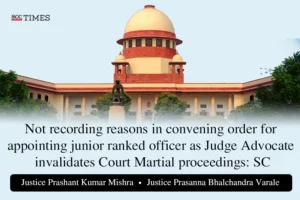Supreme Court: While considering the instant appeal challenging the decision of Punjab and Haryana High Court whereby the High Court had set aside an order passed by Armed Forces Tribunal on the ground that an officer junior to the respondent has acted as Judge Advocate in the General Court Martial, contrary to the law laid down in Union of India v. Charanjit S. Gill, (2000) 5 SCC 742; the Division Bench of Prashant Kumar Mishra* and Prasanna Bhalchandra Varale, JJ., held that the High Court did not commit any error as the legal position is well settled in Charanjit S. Gill (supra) that non recording of reasons for appointing an officer junior in rank as a Judge Advocate in the convening order, invalidates the Court Martial proceedings.
Background and Contentions:
It was alleged that the respondent, an ENT specialist, was posted with Military Hospital, Secunderabad wherein he was required to examine new recruits being forwarded by various training centers. It was alleged that for extraneous consideration, the respondent had declared an Army Recruit as ‘fit’ after previously declaring him as ‘unfit’.
Upon conclusion of trial by General Court Martial (GCM), the respondent was dismissed from service. He challenged the dismissal before the Armed Forces Tribunal which upheld the findings of guilt and the sentence of dismissal from service as awarded by the GCM. This order of the AFT was assailed by the respondent before Punjab and Haryana High Court whereby the Court allowed the writ petition on the ground that a junior ranked officer had acted Judge Advocate contrary to the law laid down in Charanjit S. Gill (supra).
Aggrieved by the decision of the High Court, Union of India filed the instant appeal.
The appellant contended that there is no blanket prohibition on appointing an officer of lower rank than the charged officer to serve as Judge Advocate in a Court Martial. It was argued that the Supreme Court in Charanjit S. Gill (supra) carved out an exception whereby non-availability of an officer of equivalent or higher rank must specifically be recorded in the convening order.
Per contra, the respondent argued that the prerequisites of bringing the appointment of an officer equivalent to or junior to the rank of the respondent were not mentioned in the certified copies of the convening order.
Court’s Assessment:
The Court clarified that it was concerned only with the legality of the appointment of Judge Advocate who was admittedly junior to the respondent.
The Court pointed out that two different convening orders were produced before the High Court- one by the appellant and the other one by the respondent.
While the documents submitted by the appellant contained the reasons for appointing a junior as the Judge Advocate, whereas in the convening order submitted by the respondent no such reason was mentioned. After comparing the documents, the High Court recorded a finding that the convening order produced by the appellant had been altered, after the order was dispatched and received by the Headquarters Artillery Centre, Hyderabad. The High Court noted that convening order presented by the appellant identically worded, but in the second page, additions vis-a-vis the reasons were made. The High Court had specifically observed that once a document has been put in the course of transmission by the General Officer Commanding, Andhra Pradesh, Tamil Nadu, Karnataka and Kerala area, the same could not be changed/altered or modified except after recording that there was a mistake, which needs correction. Once dispatched by the officer signing the same, the communication of the document is complete and any alteration in the document is unauthorised.
The Court thus pointed out that the reason for culling out exception as held permissible in Charanjit S. Gill (supra) was not mentioned in the document while the same was dispatched by the issuing authority and supplied to the respondent. Subsequent mentioning of the reason in the other document, after putting signatures by the issuing authority, was unauthorised and impermissible. Therefore, the High Court correctly held that convening order suffered from incurable defect.
The Court further stated that if the person so appointed is not fit to act and perform the duties of the Judge Advocate as held in Charanjit S. Gill (supra), Rule 103 of Army Rule would not come to the rescue of the appellant. Hence, with the afore-stated assessment, the instant appeal was dismissed.
CASE DETAILS
|
Citation: Appellants : Respondents : |
Advocates who appeared in this case For Petitioner(s): For Respondent(s): |
CORAM :

